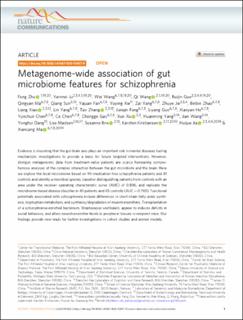Metagenome-wide association of gut microbiome features for schizophrenia
| dc.contributor.author | Zhu, Feng | |
| dc.contributor.author | Ju, Yanmei | |
| dc.contributor.author | Wang, Wei | |
| dc.contributor.author | Wang, Qi | |
| dc.contributor.author | Guo, Ruijin | |
| dc.contributor.author | Ma, Qingyan | |
| dc.contributor.author | Sun, Qiang | |
| dc.contributor.author | Fan, Yajuan | |
| dc.contributor.author | Xie, Yuying | |
| dc.contributor.author | Yang, Zai | |
| dc.contributor.author | Jie, Zhuye | |
| dc.contributor.author | Zhao, Binbin | |
| dc.contributor.author | Xiao, Liang | |
| dc.contributor.author | Yang, Lin | |
| dc.contributor.author | Zhang, Tao | |
| dc.contributor.author | Feng, Junqin | |
| dc.contributor.author | Guo, Liyang | |
| dc.contributor.author | He, Xiaoyan | |
| dc.contributor.author | Chen, Yunchun | |
| dc.contributor.author | Chen, Ce | |
| dc.contributor.author | Gao, Chengge | |
| dc.contributor.author | Xu, Xun | |
| dc.contributor.author | Yang, Huanming | |
| dc.contributor.author | Wang, Jian | |
| dc.contributor.author | Dang, Yonghui | |
| dc.contributor.author | Madsen, Lise | |
| dc.contributor.author | Brix, Susanne | |
| dc.contributor.author | Kristiansen, Karsten | |
| dc.contributor.author | Jia, Huijue | |
| dc.contributor.author | Ma, Xiancang | |
| dc.date.accessioned | 2021-04-26T11:45:47Z | |
| dc.date.available | 2021-04-26T11:45:47Z | |
| dc.date.created | 2021-03-15T13:09:43Z | |
| dc.date.issued | 2020 | |
| dc.identifier.citation | Nature Communications. 2020, 11:1612 1-10. | en_US |
| dc.identifier.issn | 2041-1723 | |
| dc.identifier.uri | https://hdl.handle.net/11250/2739592 | |
| dc.description.abstract | Evidence is mounting that the gut-brain axis plays an important role in mental diseases fueling mechanistic investigations to provide a basis for future targeted interventions. However, shotgun metagenomic data from treatment-naïve patients are scarce hampering comprehensive analyses of the complex interaction between the gut microbiota and the brain. Here we explore the fecal microbiome based on 90 medication-free schizophrenia patients and 81 controls and identify a microbial species classifier distinguishing patients from controls with an area under the receiver operating characteristic curve (AUC) of 0.896, and replicate the microbiome-based disease classifier in 45 patients and 45 controls (AUC = 0.765). Functional potentials associated with schizophrenia include differences in short-chain fatty acids synthesis, tryptophan metabolism, and synthesis/degradation of neurotransmitters. Transplantation of a schizophrenia-enriched bacterium, Streptococcus vestibularis, appear to induces deficits in social behaviors, and alters neurotransmitter levels in peripheral tissues in recipient mice. Our findings provide new leads for further investigations in cohort studies and animal models. | en_US |
| dc.language.iso | eng | en_US |
| dc.title | Metagenome-wide association of gut microbiome features for schizophrenia | en_US |
| dc.type | Peer reviewed | en_US |
| dc.type | Journal article | en_US |
| dc.description.version | publishedVersion | en_US |
| dc.source.pagenumber | 1-10 | en_US |
| dc.source.volume | 11:1612 | en_US |
| dc.source.journal | Nature Communications | en_US |
| dc.identifier.doi | 10.1038/s41467-020-15457-9 | |
| dc.identifier.cristin | 1898114 | |
| cristin.ispublished | true | |
| cristin.fulltext | original | |
| cristin.qualitycode | 2 |
Tilhørende fil(er)
Denne innførselen finnes i følgende samling(er)
-
Articles [3001]
-
Publikasjoner fra CRIStin [3023]
